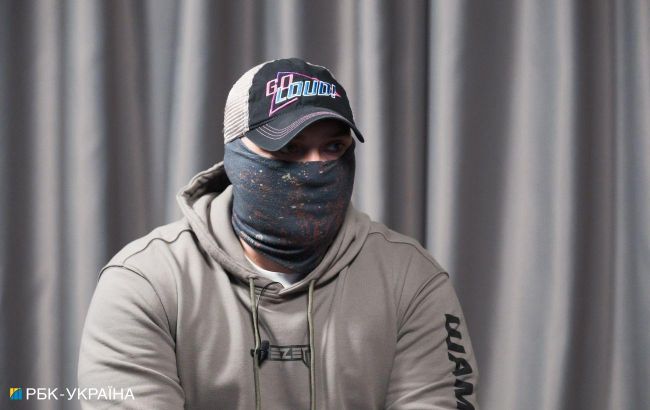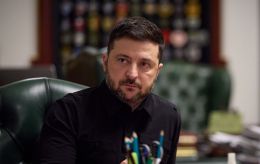Ukrainian intel officer Shaman: We actively began preparing for Russian invasion in fall of 2021
 Photo: Shaman, commander of the DIU special forces unit (RBC-Ukraine, Vitalii Nosach)
Photo: Shaman, commander of the DIU special forces unit (RBC-Ukraine, Vitalii Nosach)
The commander of the Defense intelligence of the Ministry of Defense of Ukraine special forces unit "Shaman", in an interview with RBC-Ukraine, spoke about the beginning of Russia’s full-scale invasion, the operations carried out by him and his soldiers, and whether the war can be stopped now.
The hero of this interview has been fighting against the Russians since 2015. After the start of the full-scale invasion, he — a soldier with the callsign Shaman — and his comrades formed a special unit of the same name under the supervision of the Defense Intelligence of Ukraine (DIU) of the Ministry of Defense.
"Shaman" unite began the great war with battles in Hostomel and later took part in several bold operations, both on the frontlines and deep behind enemy lines.
"We can operate against the Russians beyond our continent," says Shaman.
In an interview with RBC-Ukraine, he recalls the events of three years ago, the preparations and the beginning of Russia’s attack, explains how soldiers join his special unit, what operations they carry out, and what awaits Russia in the future.
Contents
Beginning of war, battles in Hostomel and intelligence operation on Russian territory
At the time of the full-scale invasion, Shaman — the commander of the special unit of the same name — along with a group of his comrades, was in the reception office of General Kyrylo Budanov. Between approximately 4:30 - 5:00 a.m., they heard the first explosions. After that, the head of the DIU ordered the "Shaman" unit fighters to deploy to defend the Hostomel airfield.
"We actively began preparing for the invasion in the fall of 2021— training the first people, groups that were supposed to operate in territory that could potentially be occupied, and organizing partisan movements. We started preparing all these things long before the moment of invasion. The fact that the military was preparing is also a fact. We know which units were in which places that morning. So, I find the rhetoric that someone did not know an invasion was coming to be very strange," says Shaman.
According to him, although the enemy’s airborne landing at the airport was successful, it was carried out with violations of all timing schedules. The Russians were supposed to land troops from transport aircraft, but this did not happen due to several factors. First is that the runway was blocked, and second, the first wave of helicopter troops failed to land on time to secure a foothold.
The enemy planned to capture Hostomel Airport so that it could be used as a logistical hub and a staging ground for their forces before moving into Kyiv, explains Shaman.
"So, perhaps they did complete their immediate task that day, but they did it late, with violations of all the timing schedules determined by the Russians during planning. And that led to their failure to complete their next objective, ultimately resulting in their retreat from the Kyiv region," the DIU officer explains.
After the first day in Hostomel, Shaman and his special forces unit participated in battles along the Irpin - Bucha - Hostomel - Horenka axis. In addition, two months later, soldiers from his unit carried out a daring operation on Russian territory.
"With the help of army aviation, some amazing guys, and five helicopters, we entered enemy territory in the Belgorod region, striking their oil refinery in the city of Belgorod. It was very similar to the Russian airborne assault on Hostomel, except that we did not land troops. The key factors in our success were surprise, boldness, and the enemy's belief that such a mission was impossible. The same could be said about the first Russian airborne landing in Hostomel — sudden, daring, and unexpected," recalls the commander of "Shaman".
Why Putin started war and whether his goals changed
The plan for a large-scale war never left the minds of the Russians — it was always part of a plan for revenge to restore the Soviet Union, believes the DIU officer. Furthermore, Putin’s ego was fueled by the idea that he would go down in history as the man who started a new great war in Europe.
"But this was not a spontaneous decision, nor just some whim of Putin —t his is a continuation of Russia's imperial policy towards the nations that surround it," says the intelligence officer.
He emphasized that modern Russia has a history of aggression against its neighbors—including Georgia, Chechnya, Dagestan, and Moldova (with Transnistria). All of this was about creating zones of instability, allowing Russia to maintain permanent tension, explains Shaman.
The invasion of Ukraine — a major European nation — simply continued this imperial policy.
According to Shaman, at the start of the full-scale invasion, Putin presented vague war aims, such as "denazification." This deliberate vagueness allows him to claim at any time that he has achieved his goals.

Photo: Shaman, commander of the DIU special forces unit (RBC-Ukraine, Vitalii Nosach)
History of "Shaman" special unit and their operations
The history of the unit began long before the full-scale invasion—back in 2014. During the battles in Donetsk, a group of soldiers chose their emblem—a ghost—which remains on their patches today. The ideology behind this symbol represents the inevitability of struggle and the sacredness of the Ukrainian people's fight against oppressors.
The name "Shaman" came later, after the start of Russia's full-scale invasion, when the unit’s commander adopted the callsign "Shaman."
"Since I was the commander at the time, and my callsign was Shaman, one of the intelligence officers constantly referred to us as 'Shaman’s people' for simplicity. We didn’t have an official unit name back then, but everyone understood that this emblem meant we were "Shaman’s men." As the unit grew, people started calling us "Shamanbat". The name stuck, and over time, it became a kind of brand, making it harder to change," explained the commander.
Most of the "Shaman" unit personnel had known each other before joining. Many came from the same sports clubs, neighborhoods, or cities, and even family members served together.
"For example, during our second helicopter raid into Belgorod, there were pairs of real brothers sitting in two of the helicopters," explained the DIU officer.
The unit recruits only highly skilled and mentally sharp soldiers, those capable of planning and executing complex operations.
Pause or temporary ceasefire possibility this year
According to Shaman, the battlefield has now reached a certain parity. Technically, Ukraine might be able to advance, but at this stage, no decisive arguments are being made on the frontlines. Meanwhile, the enemy's offensive operations are also limited and ineffective.
"In the grand scale of this war, 10 kilometers in either direction does not play any strategic role. These are just tactical successes. Considering them significant would be an insult to the concept of war itself.
If neither side changes the battlefield dynamics, this war is doomed to become prolonged. And a prolonged war is especially bad for Russia's economy, which is already crippled by sanctions and heading toward collapse," says the DIU commander.
He believes that Russia will never abandon its imperial ambitions. Having a strong, developed Ukraine next door would be an unbearable and infuriating factor for them.
"They will always try to conquer our country. Anyone thinking this will simply stop and can be waited out is making a grave mistake. The only way for Ukraine to truly win, in my opinion, is to dismantle Russia into several independent states. Only then can these regions have a chance at a better life.
Russia, as an imperial project, is doomed to be a real-life version of Mordor," reflects Shaman.
At the same time, he considers a temporary ceasefire in 2024 to be realistic, though he does not yet see in what form or format.
"Will a pause benefit Ukraine? For Russia—definitely. They adapt quickly and learn from mistakes. We need to be mindful of this. If Ukraine fails to learn its own lessons, we will face serious problems," concludes the DIU officer.

